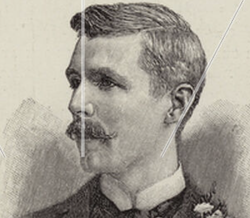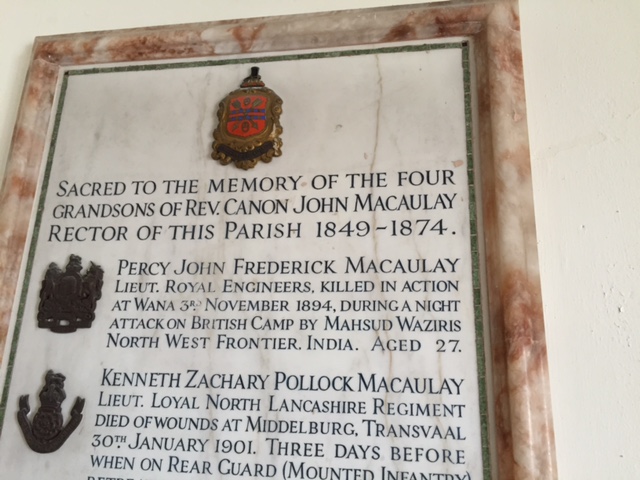Attack on Wana, Waziristan,1894
Lieutenant Percy John Frederick Macaulay, Royal Engineers
St. Cuthbert's, Aldingham, Cumbria

It is the sheer arrogance that never fails to astound me. Two countries decide they need a clearly defined border and so they invent one, drawing a line across a landscape that it is inhabited by people who do not recognise the sovereignty of either side. The two countries were Britain and Afghanistan in 1894, albeit admittedly the latter was under severe British pressure to comply, especially as at the time Britain controlled Afghan foreign affairs. The people being divided were the Pushtun tribes of India's North-West frontier, in particular the Waziris, who found themselves nominally either British or Afghanistani, without any meaningful consultation or approval. Unsurprisingly, they did not cooperate.
Thus it was that when the Border Commission set up camp at Wana, on the Wana Plain in what is now South Waziristan, there was some unrest. Word was spreading that a Waziri mullah, Mullah Powindah, operating independently of local chiefs, was fomenting opposition, and so a military force was sent to provide protection to the Border surveyors. Two and a half thousand men, under Brigadier-General A. H. Turner, set up camp close to the Border Commission post. Not expecting any serious trouble the camp, going against standard practice in tribal lands, was only lightly fortified, with pickets doubled and the men being ordered to sleep with their guns ready.
The Border Commission men was made up of surveyors, engineers, sappers and labourers. It included one officer of the Royal Engineers, Lieutenant Percy John Macaulay. Indian-born, the son of a Colonel in the Indian Staff Corps, but educated at Marlborough College before attending the Royal Military Academies at Sandhurst and Chatham. Macaulay had served in India since 1878, principally involved in road and railway survey work in Baluchistan and Afghanistan, so he had familiarity with tribal areas. His role over the coming weeks was to supervise the erection of a series of white posts which would mark the course of the border, known as the Durand Line after the British diplomat who was most closely involved in its devising.
General Turner was taking a risk, not only for the reasons mentioned above, but also because his camp was flanked by two nullahs, dry watercourses deep enough for men to hide in, and the men Mullah Powindah was inciting to fight were Mahsud Waziris, a tribe renowned for their ability to spring sudden ambushes, preferring that to open ground fighting.
In the pitch-black of half-past five in the morning, that is what they did. Hundreds of Mahsud attackers stormed into and through the camp, yelling and screaming, while drums beat from all around.The British soldiers, startled from sleep and mostly still in their tents, found themselves engaged in hand-to-hand fighting in the darkness. In the fighting four British officers and nineteen men were killed, and amongst them was Percy Macaulay. It's an interesting thought that he may have been targeted as he had been identified as the surveyor responsible for setting the white posts.
The fight was over very quickly. Texts refer to it as the Battle of Wana, but it only lasted thirty minutes. As dawn broke the Waziris departed, taking rifles, ammunition and money, and leaving some very humiliated British behind. The subsequent revenge mission, burning some villages and establishing more permanent posts, lasted until March 1895, although the stolen cash and weapons were not fully returned, and Mullah Powindah remained at large, retreating into the Afghan mountains.
Percy Macaulay's memorial is on the walls of St. Cuthbert's Church in Aldingham, a village on the Furness peninsula, overlooking Morecambe Bay. His grandfather, the Reverend John, had been vicar there for twenty-five years, and the plaque commemorates four of his grandsons, two victims of World War One, one who died in the Boer War, and Percy.
Thus it was that when the Border Commission set up camp at Wana, on the Wana Plain in what is now South Waziristan, there was some unrest. Word was spreading that a Waziri mullah, Mullah Powindah, operating independently of local chiefs, was fomenting opposition, and so a military force was sent to provide protection to the Border surveyors. Two and a half thousand men, under Brigadier-General A. H. Turner, set up camp close to the Border Commission post. Not expecting any serious trouble the camp, going against standard practice in tribal lands, was only lightly fortified, with pickets doubled and the men being ordered to sleep with their guns ready.
The Border Commission men was made up of surveyors, engineers, sappers and labourers. It included one officer of the Royal Engineers, Lieutenant Percy John Macaulay. Indian-born, the son of a Colonel in the Indian Staff Corps, but educated at Marlborough College before attending the Royal Military Academies at Sandhurst and Chatham. Macaulay had served in India since 1878, principally involved in road and railway survey work in Baluchistan and Afghanistan, so he had familiarity with tribal areas. His role over the coming weeks was to supervise the erection of a series of white posts which would mark the course of the border, known as the Durand Line after the British diplomat who was most closely involved in its devising.
General Turner was taking a risk, not only for the reasons mentioned above, but also because his camp was flanked by two nullahs, dry watercourses deep enough for men to hide in, and the men Mullah Powindah was inciting to fight were Mahsud Waziris, a tribe renowned for their ability to spring sudden ambushes, preferring that to open ground fighting.
In the pitch-black of half-past five in the morning, that is what they did. Hundreds of Mahsud attackers stormed into and through the camp, yelling and screaming, while drums beat from all around.The British soldiers, startled from sleep and mostly still in their tents, found themselves engaged in hand-to-hand fighting in the darkness. In the fighting four British officers and nineteen men were killed, and amongst them was Percy Macaulay. It's an interesting thought that he may have been targeted as he had been identified as the surveyor responsible for setting the white posts.
The fight was over very quickly. Texts refer to it as the Battle of Wana, but it only lasted thirty minutes. As dawn broke the Waziris departed, taking rifles, ammunition and money, and leaving some very humiliated British behind. The subsequent revenge mission, burning some villages and establishing more permanent posts, lasted until March 1895, although the stolen cash and weapons were not fully returned, and Mullah Powindah remained at large, retreating into the Afghan mountains.
Percy Macaulay's memorial is on the walls of St. Cuthbert's Church in Aldingham, a village on the Furness peninsula, overlooking Morecambe Bay. His grandfather, the Reverend John, had been vicar there for twenty-five years, and the plaque commemorates four of his grandsons, two victims of World War One, one who died in the Boer War, and Percy.
Sources
Military
Wikipedia
www.britishbattles.com - an excellent site with details of scores of British army battles
www.thegazette.co.uk Issue 26639, pag 3733 - report sent by General Turner
www.lookandlearn.com - contain Percy Macaulay's obituary
Military
Wikipedia
www.britishbattles.com - an excellent site with details of scores of British army battles
www.thegazette.co.uk Issue 26639, pag 3733 - report sent by General Turner
www.lookandlearn.com - contain Percy Macaulay's obituary

